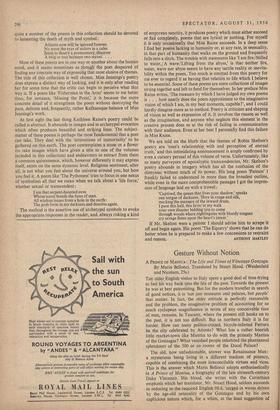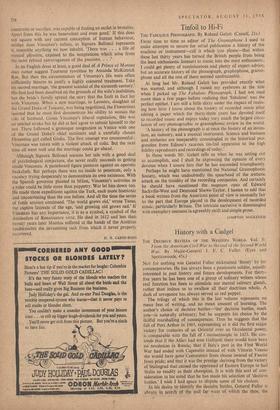Gesture Without Notion
THE older English visitor to Italy spent a good deal of time trying to feel his way back into the life of the past. Towards the present he was at best patronising. But for the modern traveller in search of good notices, it is 'not just museums and palaces, but people' that matter. In fact, the older attitude is perfectly reasonable and the problem, the imaginative problem of accounting for so much cyclopean magnificence in terms of any conceivable race of men, remains. In Tuscany, where the present still hooks on to the past, it is not too difficult. But in northern Italy it is far harder. How can nasty politics-crazed, bicycle-infested Ferrara be the city celebrated by Ariosto? What has a rather boorish little market-town like Mantua to do with the princely Mantua of the Gonzagas? What vanished people inhabited the phantasmal splendours of the 500 or so rooms of the Ducal Palace?
The old, now unfashionable, answer was Renaissance Man : a mysterious being living in a different medium of potency, capable of combining the most irreconcilable virtues and vices. This is the answer which Maria Bellonci adopts enthusiastically in A Prince of Mantua, a biography of the late sixteenth-century Duke Vincenzo. His blood, she writes with the Corinthian emphasis which her translator, Mr. Stuart Hood, seldom succeeds in reducing to the required English 98.4, `s.urged in waves driven by the age-old sensuality of the Gonzagas and by his own capricious nature which, for a whim, at the least suggestion of constraint or sacrifice, was capable of finding an outlet in brutality. Apart from this he was benevolent and even good.' If this does not square with any current conception of human behaviour, neither does Vincenzo's milieu, as Signora Bellonci represents it, resemble anything we now inhabit. 'There was . . . a life of sensual pleasure, exposed to the temptations which arise from I he most refined extravagances of the passions. . .
In its English dress at least, a good deal of A Prince of Mantua does rather suggest Tourneur rewritten by Amanda McKittrick Ros. But then the circumstances of Vincenzb's life were often sufficiently bizarre to justify a highly coloured treatment. Take his second marriage, 'the greatest scandal of the sixteenth century.'. His first had been dissolved on the grounds of the wife's inabilities, but the bride's family spread the story that the fault in fact lay with Vincenzo. When a new marriage, to Leonora, daughter of the Grand Duke of Tuscany, was being negotiated, the Florentines insisted that he must first demonstrate his ability to sustain the role of husband. Given Vincenzo's liberal reputation, this was an unkind stroke bul he did at Iasi agree to submit himself to the test. There followed a grotesque assignation in Venice with one of the Grand Duke's chief ministers and a carefully chosen Florentine girl called Giulia. The first attempt was unsuccessful : Vincenzo was taken with a violent attack of colic. But the next time all went well and the marriage could go ahead.
D. S. CARNE-ROSS



































 Previous page
Previous page